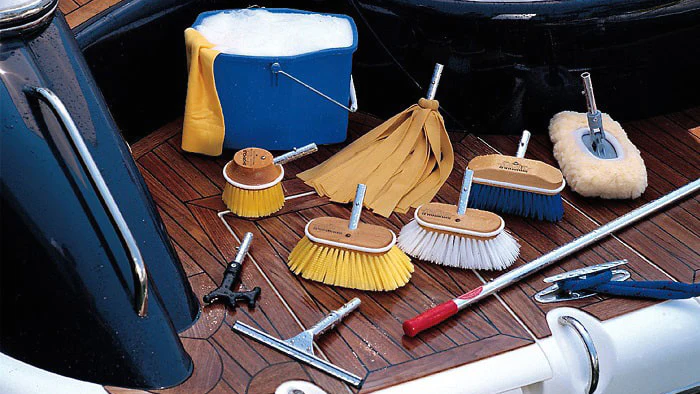Boats are constantly exposed to the weather. Boats can be damaged by the sun, wind, and water. Boat owners must be aware of how to protect and clean their boats.
Boat cleaning is important, even though it can be tedious and time-consuming. Professional detailing is expensive, even if you pay someone else to do it. This article provides a guideline for cleaning your boat.
Exterior Care
Cleaning your hull is crucial. Cleaning products are no different. Under your sink, do not reach for household Boat Cleaning Products & Supplies. It could damage your boat. Choose marine-grade products that have a pH neutral of 7. It will not damage the surface of your hull.
Aluminium Boats
Use a marine cleaner to remove surface stains and waterline marks from aluminum boats every few months. Start at the bottom and work up to avoid leaving marks. Apply aluminium polish with a soft, clean cloth. Rinse your boat every few weeks to keep it clean and free of oxidation.
Fibreglass
Once a week, a quick rinse using water and a garden hose will remove the grime from fibreglass hulls. Only use boat soap if you have a dirty boat. The gelcoat integrity can be compromised if you wash it every week with soap. To avoid scratching your boat, use a chamois to dry it. Finally, use a soft cloth to buff away any water marks. You can use a boat wax to maintain and restore gelcoat. Apply it two or three times per year.
Canvas And Isinglass
It is important to clean your canvas and Isinglass panels regularly in order to avoid mould. You can keep them clean with a gentle scrubbing using a soft bristle brush and mild soapy hose water. Rinse with warm water to avoid water spots and then dry with a soft chamois.
Wood
Your boat’s teak paneling, deck or other external structural wood needs to be maintained in order to protect it from UV damage, seawater, and weathering effects caused by wind. Keep your wooden surfaces clean with mild soapy-water. Consult the manufacturer prior to applying any staining or waxing.
Engines
No matter whether the engine is inboard or an outboard, it needs to be cleaned both inside and outside regularly. For an outboard motor, you will need to wax the cowl and exterior before washing it down with soap and water. These surfaces are similar in appearance to automotive finishes. Treat them as you would your car. Use microfiber wash mitts or towels. Avoid using an abrasive brush on the cowl.
What about the underside of the cowls? What about the engine if you have an inboard? You must remove all dirt and grime. Be aware that some chemicals or cleaners can damage electrical wires and components. It is not recommended to clean the engine on a flat surface.
Maintain An Interior Of Superior Quality |maintain A Superior Interior
After you have cleaned your exterior, now is the time to clean your inside. You should first avoid using bleach. To remove mildew and mould, you should use only a product designed for boat cleaning. The regular household bleach can be too harsh on boat surfaces. It can crack vinyl and damage stitching. It can also end up in areas you don’t like, such as carpets.
Marine Carpet is a great option for carpet cleaning. It can help keep your boat smelling fresh, whether it’s wet or dry. Marine carpet can become stale quickly if not properly cleaned. It is designed to resist moisture but will soon lose its freshness if not regularly vacuumed. By regularly vacuuming your marine carpet and performing spot cleaning with soapy, warm water, you can extend its life by up to half.
Cushions And Seats
It is essential to use a vinyl cleaner on cushions and seats in order to remove mould, sunscreen, or salt that may be embedded. Boat vinyl cleaner is available online or at boat supply shops. Fabric cushion covers can be washed in the washer. Be sure to follow the manufacturer’s instructions. When shrinkage may occur, avoid tumble drying.
Non-slip Fibreglass
A non-slip fibreglass surface can be protected by using a polymer-treated deck and a stiff-bristle brush.
Vinyl
All types of boats use vinyl, even those that have lots of seating and are used for water sports or cruising. Modern marine vinyls have anti-microbial properties, which are best for protecting against mildew and mould. Every time you use your vessel, give vinyls a gentle clean with soapy water. To remove stubborn stains, you should use marine vinyl cleaner. After rinsing the boat, apply a vinyl protectant.
Heads And Bathrooms
The same cleaning methods can be used for the bathroom and head. It is essential to use non-slip formulations for your own safety and that of your passengers.
Protect Your Investment
Boats are a lot of fun, but can also be a lot to work. No matter how big or expensive your boat is, it’s an investment. You should maintain and protect your boat to continue to enjoy its use.
